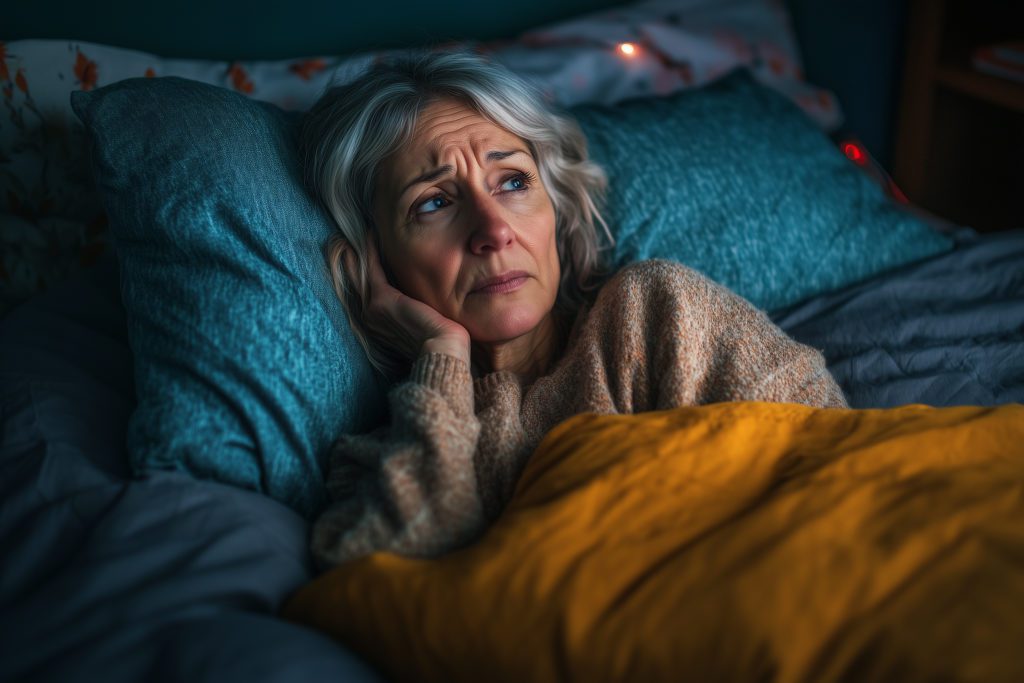
Hot Flashes and Night Sweats: Managing Menopausal Symptoms for Improved Sleep
While menopause and sleep problems might seem like an inseparable duo, we're here to play matchmaker and help you find that peaceful sleep.

Menopause often brings along a range of symptoms that can disrupt your sleep, with hot flashes and night sweats being among the most notorious. These symptoms don't just cause discomfort; they can severely impact your quality of sleep. Although menopause and sleep problems might seem like an inseparable duo, we aim to help you achieve the peaceful sleep you deserve.
In this article, we'll explore why menopause often transforms bedtime into a challenging experience and, more importantly, what you can do to improve it. From simple lifestyle adjustments to medical treatments, we've got you covered. So, settle into a comfortable spot, and let's delve into managing menopausal symptoms for a better night's sleep.
The Basics About Menopause and Sleep Problems
Menopause marks the end of a woman's menstrual cycles, typically occurring in her late 40s or early 50s. However, this new stage comes with its own set of challenges, particularly related to sleep.
Menopause and sleep problems are often interrelated. Hot flashes and night sweats are the usual suspects behind those restless nights. These sudden surges of heat, followed by intense sweating, can jolt you awake multiple times a night. And it's not just the sweating; hormonal changes also play a villainous role, throwing your sleep cycle into disarray.
Poor sleep doesn't just leave you feeling groggy. It can affect your mood, concentration, and overall health. Chronic sleep deprivation can even increase the risk of conditions like heart disease and diabetes. So, it's crucial to tackle these sleep problems head-on. Let's look at some strategies to keep those hot flashes and night sweats at bay.
Strategies to Manage Hot Flashes and Night Sweats
Lifestyle Changes
A few adjustments in your lifestyle can go a long way. Start with your diet—spicy foods and caffeine can trigger hot flashes, so perhaps save that extra-hot salsa for daytime snacking. Additionally, hydration is key to maintaining the symptoms of hot flashes and night sweats, so keep that water bottle at your bedside.
Exercise
Exercise is another great way to manage menopausal symptoms. A good workout routine can help regulate your body temperature and reduce stress.
Relaxation Techniques
Speaking of stress, adopting relaxation techniques like yoga or meditation can be a game-changer.
Comfortable Sleeping Space
Creating a cool sleeping environment is also crucial. If you don't already have one, consider investing in a fan or an air conditioner. Breathable bedding and light pajamas made of natural fibers like cotton can make a world of difference. You can also try placing a cold pack under your pillow or keeping a glass of cold water by your bedside for those middle-of-the-night heat waves.
Of course, these are just starting points. If lifestyle adjustments aren't enough, there are other options. Let's not get ahead of ourselves! We've got plenty more tips up our sleeves to ensure you sleep like a baby.
Medical and Alternative Treatments
When lifestyle tweaks aren't cutting it, it might be time to bring in the big guns—medical treatments.
Medical Treatments
Hormone Replacement Therapy (HRT) is a popular option. It works by balancing the hormones that go haywire during menopause, which can significantly reduce hot flashes and night sweats. However, it's not for everyone. Potential risks are involved, so having a heart-to-heart with your healthcare provider is crucial to weigh the benefits and risks.
Non-hormonal medications are another option. These include antidepressants that have been found to alleviate menopausal symptoms. Again, an appointment with your doctor is essential to find the best fit for you.
Alternative Method
But wait, there's more! If you're open to alternative therapies, several options might help. Herbal supplements like black cohosh and red clover have been touted for their menopausal symptom-relieving properties. Always consult your healthcare professional before starting any new supplement to ensure it won't interfere with your existing medications.
Acupuncture and mindfulness practices like meditation and deep-breathing exercises can also provide relief. They might not cool you down instantly, but they can help reduce overall stress and improve your sleep quality.
Role of Sleep Hygiene in Managing Menopause and Sleep Problems
Good sleep hygiene helps against menopause and sleep problems. Think of it as the bedtime routine that could transform your nights from restless to restful. Start by sticking to a consistent sleep schedule, even on weekends. Your body loves routine, and a regular sleep-wake cycle can make falling asleep easier.
Limit screen time before bed. The blue light from phones and tablets can mess with your melatonin levels, making it harder to drift off. Instead, opt for a calming pre-bedtime routine like reading a book (preferably not on a screen), taking a warm bath, or practicing relaxation exercises.
Creating a sleep-friendly environment is also key. Keep your bedroom cool, dark, and quiet. If your partner's snoring adds to your woes, consider earplugs or a white noise machine. Every little bit helps when it comes to fostering an environment conducive to sleep.
For tech-savvy sleepers, Pillow can be a valuable ally in managing menopause and sleep problems. This handy app offers sleep tracking and personalized insights, helping you better understand your sleep patterns.
We know that menopause and sleep problems may seem like an unbreakable duo, but with the right strategies, you can reclaim your nights. From lifestyle changes and medical treatments to good sleep hygiene, there are plenty of ways to manage those pesky symptoms.

Written by
Dr Aqsa
As a Medical Doctor, Dr Aqsa, uses her knowledge to craft complex medical information that is understandable to the general public. For years, she has tried to improve health literacy and empower readers with valuable health knowledge through her articles, blog posts, and educational materials.
Download Pillow
Get help
Press & News
Legal
Connect
X (Twitter)
Company
Copyright © Neybox Digital Ltd.



